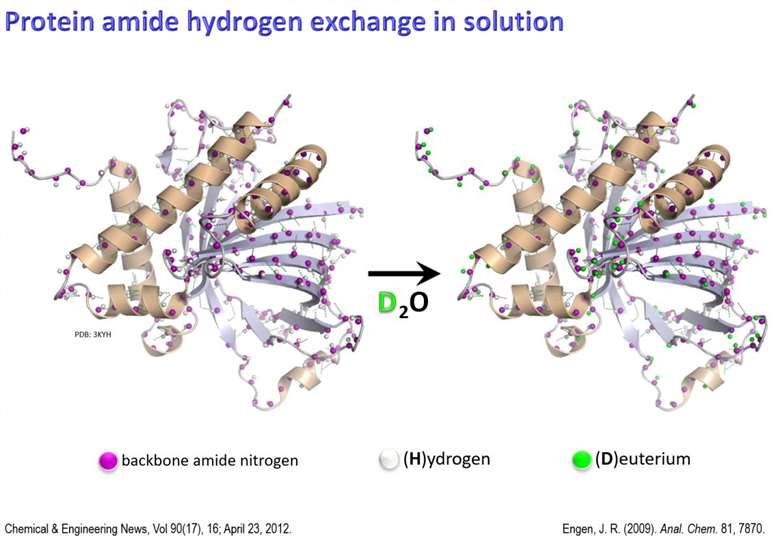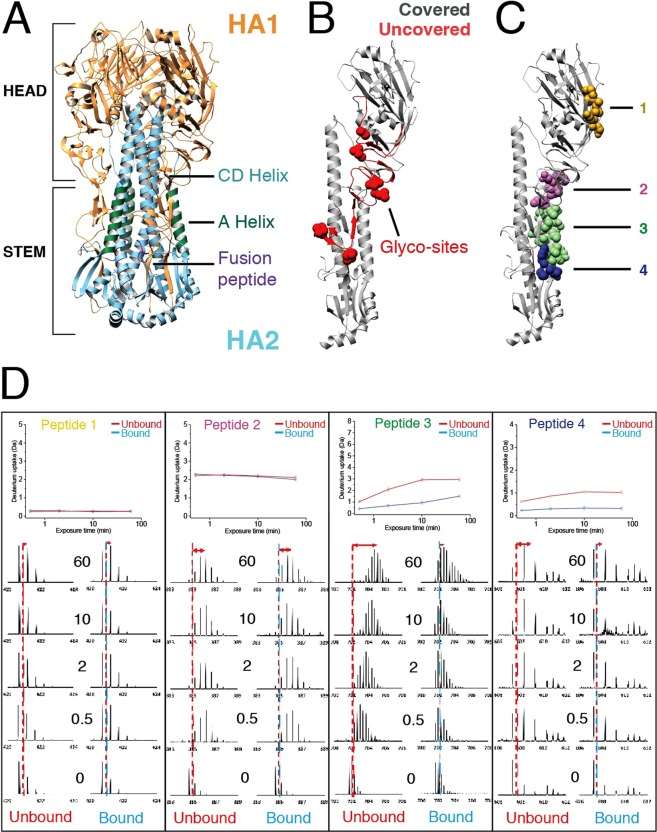Epitopes are the basis of protein antigenicity, and the study of protein antigenic epitopes is important for the design of novel vaccine molecules, novel diagnostic reagents, peptides, therapeutic antibodies, etc. with immunogenic and neutralizing activity.
Hydrogen-deuterium exchange mass spectrometry (HDX-MS), which has emerged at the forefront of protein research, can provide direct information on which amino acid sequences are located at the surface positions of protein spatial structures (including those under dynamic change), possible active sites and protein-protein interaction sites.
More comprehensive epitope structure information for antigen-antibody interaction studies epitope recognition with functional mAbs is critical for understanding the nature of the immune response and improving the design of vaccines, therapeutics, and diagnostics. In recent years, the identification of B cell epitopes targeting neutralizing antibodies has facilitated the design of peptide-based vaccines against highly mutated pathogens such as HIV, respiratory syncytial virus, and Helicobacter pylori. But these products have not yet entered the clinical stage. Conventional linear epitope recognition can only partially reflect the immunogenicity of the epitope in its native conformation. HDX-MS can quickly provide comprehensive information on epitope structure.

HDX-MS for protein dynamic structure research (John Engen, Northeastern University, Chem and Engg News (2012))
More rapid identification of antigenic sites for drug screening of influenza virus hemagglutinin antigenic epitopes.
Epitope characterization is critical for resolving the mechanism of action of drug candidates. Traditional X-ray crystal diffraction methods are often time consuming to collect data from protein crystals. Due to the intrinsic complexity of proteins and the difficulty in obtaining ideal single crystals for specific manipulations, this approach is not easily successful and is not realistic when large numbers of drug candidates need to be screened to identify similar targets. Nuclear magnetic resonance (NMR) techniques are often limited by the molecular weight of the protein.
The Janssen Vaccine and Prevention Research Center used HDX-MS to develop the conformational effects of different drug molecules combined with hemagglutinin HA. Based on the HDX-MS platform, it systematically explored the combination of HA subtypes with 4 different drugs (including Monoclonal Antibody and Small Molecule Synthetic Peptide) candidates. This rapid, low-cost HDX-MS epitope method accurately identified all major antigenic sites.
This screening strategy offers the following advantages in early drug discovery.
- Low sample volume requirements
- Short collection and analysis time
- No molecular weight restrictions
- Protein dynamics data in the natural environment

HDX-MS reveals the conformational dynamics of free- and Fab-bound HA trimers in solution (Sci. Rep. 2019, 9, 4735.)
More accurate target identification for antibody-virus particle complex epitope studies
An in-depth understanding of virus structure and surface antigens can reveal the molecular mechanism of virus infection of cells and drug action, which is the basis for research on virus prevention and drug development. HDX-MS is also widely used in virus structure research, including virus epitope identification, virus capsid folding, aggregation, assembly and maturation, virus structure changes and dynamics, virus-cell membrane fusion, etc.
Emerging tools for protein structure analysis
As a method for analyzing protein structures and their molecular dynamics, HDX-MS is mainly used to help scientists gain insight into structural changes in proteins. This technique has a wide range of applications in the study of antigen-antibody mutual recognition, the development of novel vaccines, and the development of drugs. Antigen epitopes are a very important aspect in the development of new protein formulations, locating a promising antibody epitope can lead to significant commercial results, and epitope information is critical for patent protection.
Our Epitope Mapping Service by HDX-MS
Creative proteomics provides state-of-the-art instrumentation and services for HDX-MS technology to rapidly characterize binding sites by HDX-MS. Our epitope mapping service by HDX allows linear and conformational epitope characterization with high resolution and highest success rate. To date, we have successfully identified the epitopes of dozens of antigens with hundreds of antibodies.
Key Features
100% successful rate
Amino acid resolution
Linear and conformational epitopes
High-throughput screening of >50 candidates against one antigen
Accurate mapping for glycosylated antigens by FineMapping technology
Epitope mapping for unpurified/difficult targets
Epitope mapping for bispecific antibodies
Tailored service by top-down, bottom-up, or middle-down HDX-MS
Unparalleled sensitivity using subzero HPLC technology
Comprehensive and easy-to-understand report
Other Services that Creative Proteomics HDX-MS provide
Biosimilar characterization
Higher-order structure
Conformational/Protein dynamics
Small molecules interaction (Compound binding analysis)
Protein-Protein interactions
Protein folding characterization
References
- Waters COI (Centers Of Innovation Program),John Engen, Northeastern University;Ganesh Anand,National University of Singapore.
- Nat. Commun. 2017, 8, 14339
- Sci. Rep. 2019, 9, 4735
- PNAS, 2013,110(9), 3305-3309






